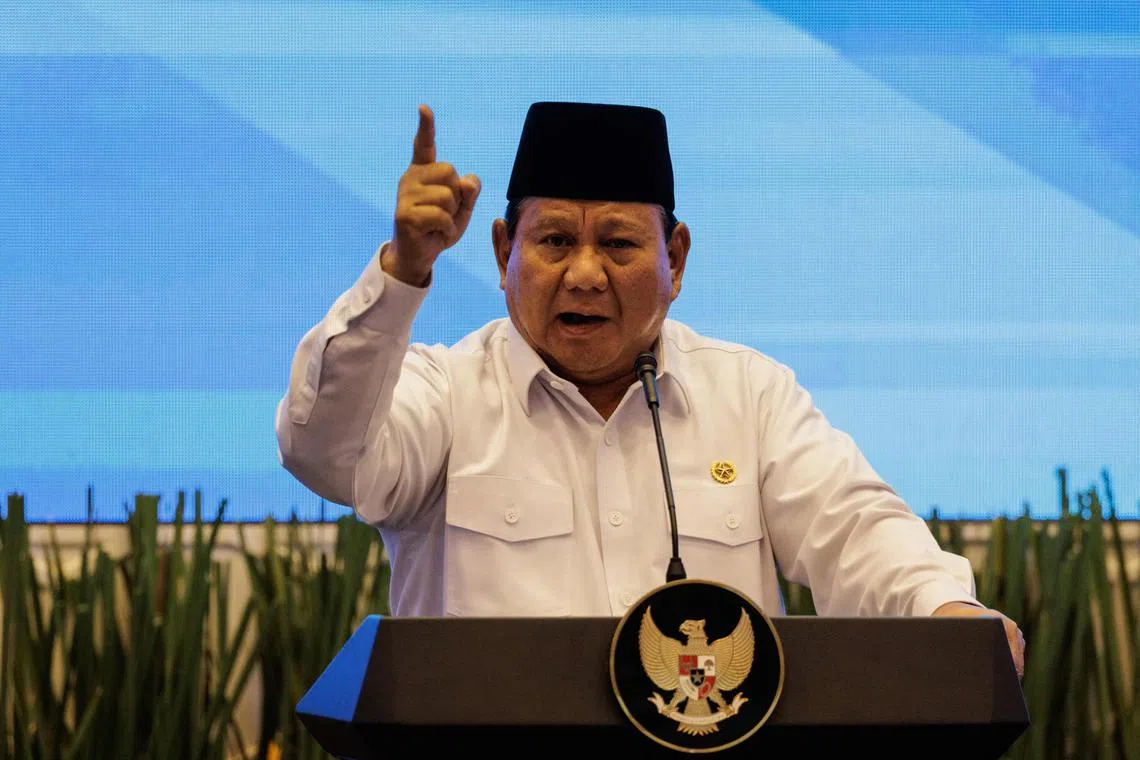News analysis
Prabowo faces investor revolt over Indonesia’s economic path
Sign up now: Get ST's newsletters delivered to your inbox

Indonesia President Prabowo Subianto has been causing unease with his populist spending measures and plans to dilute the central bank’s independence.
PHOTO: AFP
Singapore – For months, President Prabowo Subianto’s moves to chip away at Indonesia’s long-established economic guardrails have stoked anxiety in markets. This week’s sudden rout suggests investor patience is wearing thin.
The former general has been causing unease with his populist spending measures, plans to dilute the central bank’s independence and aggressive policies against foreign businesses like Apple. He fast-tracked laws to expand the role of the military too, triggering angry student protests in Jakarta.
The tipping point came on March 18, when rumours spread that Finance Minister Sri Mulyani Indrawati, who has kept a tight rein on spending during her cumulative 14 years in office, would resign. The stock market dropped the most in three years on the day, prompting government officials and Dr Sri Mulyani herself to come out, one by one, to dispel the speculation. Bank Indonesia was forced to step in to protect the rupiah, Asia’s worst-performing currency in 2025.
The rumours have “renewed fears of reformists being purged and were a catalyst for exposing all the economic problems the country is facing”, said Mr John Foo, founder of Valverde Investment Partners.
While there has been some reprieve in the markets since then, investors remain rattled by Mr Prabowo’s policy moves, coming at a time when South-east Asia’s biggest economy is also grappling with US President Donald Trump’s tariff threats and waning demand from China for raw materials.
Top of mind for investors is the fiscal outlook. Once cited by Morgan Stanley as one of the “Fragile Five” markets prone to wild swings in foreign sentiment, Indonesia has steadily improved its credibility with investors, thanks to prudent economic management that has lifted its credit rating out of junk status.
Mr Prabowo, 73, is now threatening to upend that trajectory. His policy steps since taking office in October could push the budget deficit closer to its legal limit of 3 per cent of gross domestic product. He increased his Cabinet to more than 100 from around 60 under his predecessor Joko Widodo. After a public outcry, he backtracked on hiking the value-added tax rate, a move which would have boosted government revenue.
He implemented a free lunch programme for students – a signature campaign pledge – that will cost US$30 billion (S$40 billion) a year, the equivalent of 14 per cent of Indonesia’s entire 2024 budget. To pay for that, he slashed spending in other areas, like infrastructure projects and travel.
“People in the markets are concerned about economic policymaking,” said Mr Achmad Sukarsono, lead analyst for Indonesia at Control Risks. “They have seen that many policies – let’s just say – do not have sound economic grounding.”
‘Wake-up call’
The government delayed releasing monthly budget data for January, leading investors to question the state of the government’s finances. The figures were finally published last week, showing a surprise deficit as both revenues and expenditures plunged.
None of that bodes well for Mr Prabowo’s biggest pledge of all: boosting economic growth to 8 per cent. Analysts say that goal is unrealistic, with the market consensus closer to 5 per cent growth in 2025.
“The President remains focused on fulfilling his populist campaign promises, which require efficient execution,” said Mr Aditya Perdana, a political lecturer at the University of Indonesia, describing the effort as uneven and selective. “From a political perspective, this should serve as a wake-up call for the government to adjust its course before losing further credibility.”
Mr Prabowo’s creation of a sovereign wealth fund, Danantara, is another source of concern. The fund will take control of the nation’s state-owned enterprises and have a sweeping mandate to invest across industries. The government will channel US$20 billion from the existing budget into the fund, which will be run by business-savvy allies and report directly to the President.
Authoritarian past
Mr Prabowo’s actions appear in many ways to be at odds with the very institutions put in place to win the faith of voters and investors after the downfall of former dictator Suharto, who ruled Indonesia for three decades until his ouster amid street protests in the late 1990s.
His allies in Parliament, for example, moved swiftly to pass a controversial law to expand the role of the military, despite public criticism that the changes are reminiscent of the nation’s authoritarian past. Thousands of students took to the streets in the capital on March 20, throwing stones, spray-painting walls and setting tyres ablaze as they demanded lawmakers reverse the changes, according to local reports.
Market reaction to the law’s passage indicates a cautious approach from investors reflecting concerns “about potential shifts in Indonesia’s democratic trajectory and governance structures”, said SGMC Capital senior partner Mohit Mirpuri.
Citigroup analyst Ferry Wong said of the protests: “We believe this could provide some uncertainty in the market.”
Lawmakers have also been talking about potentially expanding the mandate of the central bank. That renewed investor concerns about Bank Indonesia’s independence after an earlier draft of the financial sector omnibus law added job creation to the central bank’s objectives. Governor Perry Warjiyo said this week the rule changes would only “emphasise” but not fundamentally change its current goals.
To be sure, none of this appears to pose any imminent threat to Mr Prabowo, who enjoys an overwhelming parliamentary majority, while the country’s sole opposition party is still seen lending legislative support on matters like the military law. State revenues are also poised to see a turnaround in March, Dr Sri Mulyani said on March 18, and the government has pledged to maintain its budget deficit at 2.5 per cent of GDP in 2025, well within the legal limit.
It remains to be seen whether those assurances will be enough to ease investor concerns. BLOOMBERG


